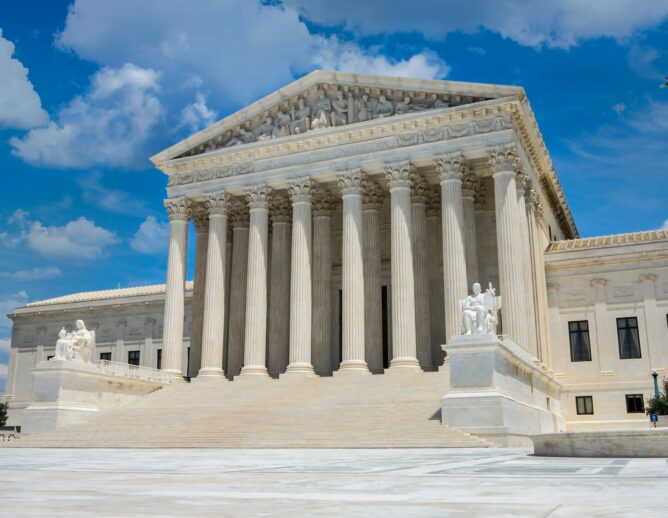This blog was written by Lawrence O. Gostin, J.D., LL.D., Director, O’Neill Institute for National and Global Health Law, James G. Hodge, Jr., J.D., LL.M., Professor of Public Health Law and Ethics; Director, Center for Public Health Law and Policy, Sandra Day O’Connor College of Law, Arizona State University (ASU) and Walter Johnson, M.S.T.P., Senior Legal Researcher, CPHLP and J.D. Candidate (2020), Sandra Day O’Connor College of Law, ASU.
In 2016, life expectancy at birth for Americans fell for the second year in a row driven by the opioid crisis, obesity, suicides, and inaccessible health care. More than ever, national public health needs public and private sector commitments, renewed investments, and a strong respect for science- and evidence-based outcomes. Instead, it seems politics trumps health, emboldened by a President and his Cabinet appointees who prioritize the rich over the poor and big business over healthy communities. Among other emerging challenges are 6 key ways that the Trump Administration undermines public health nationally and globally.
- The War on Science
President Trump constantly casts doubt on the validity of science and scientific evidence. During his Presidential campaign, he repeated the common myth that childhood vaccines cause autism. As President, he considered convening a governmental committee to investigate such claims, which scientists determined decades ago were baseless.
President Trump cast aside the overwhelming scientific consensus that humans accelerate climate change, withdrawing from the Paris Agreement. He facilitated the dismantling of major initiatives by the Environmental Protection Agency (EPA) designed to address climate risks, including rolling back dozens of Obama-era environmental protection rules to limit greenhouse gases and promote vehicle fuel economy. EPA Commissioner, Scott Pruitt, resigned in July amidst scandal. A group of progressive states have formed a compact to uphold the pledges America made in the Paris negotiations.
When justifying programs and policies to Congress, our national leaders should want to know evidence of what works to safeguard the public’s health and safety. Yet, President Trump’s Administration instructed the nation’s leading public health agency, the Centers for Disease Control and Prevention (CDC), not to use 7 terms—diversity, transgender, vulnerable, fetus, entitlement, evidence-based and science-based—in its budget requests to Congress. Yielding to the National Rifle Association, Congress virtually forbids CDC from conducting firearms-related research. Finding evidence-based interventions to reduce firearm-related injuries and deaths is, however, a core governmental obligation.
- Dismantling the Affordable Care Act

Photo credit: Gage Skidmore
Congress has tried unsuccessfully 70 times to completely dismantle the Affordable Care Act (ACA), but “Obamacare” is still badly damaged. President Trump’s Tax Cuts and Jobs Act of 2017 gave corporations a massive tax reduction and debilitated the ACA’s individual mandate to buy health insurance. Now Congress is considering rescinding the employer mandate, which requires large organizations to offer health plans to employees. These mandates get to the heart of health insurance systems, whereby the young subsidize the old, the healthy subsidize the sick, and the rich subsidize the poor.
Where cross-subsidies are insufficient, government needs to step in. Yet, the Trump Administration has opposed ACA subsidies for persons who are ineligible for Medicaid but also cannot afford private health coverage. Congress has also considered repealing the requirement that health insurers offer “essential health benefits” including emergency, maternity/pediatric, mental health, drug-addiction, and preventive/wellness services. President Trump would allow bare bones health insurance, absent crucial prevention and curative health services.
Perhaps most cruelly, states can opt-out of ACA’s Medicaid expansion or require existing recipients to work (subject to exceptions) or else lose their health coverage. Even as Kentucky received first approval for its Medicaid work requirements through the Centers for Medicare and Medicaid Services (CMS), state officials admitted nearly 100,000 residents would be dropped from coverage, including thousands who work but might not complete administrative requirements. Kentucky’s work requirements have since been nullified (at least initially) by a federal district court. Empirical evidence shows that work requirements do not lead to good jobs, but are effective at impeding access to needed government services.
- “Unhealthy” Regulations
If the Trump Administration seems committed to one big idea, it is gutting or delaying health regulations developed under former President Obama. As per the ACA and other initiatives, the Administration has stalled implementation of substantial revisions to the Common Rule guiding human subjects research; fair housing regulations responding to racial disparities and social determinants of health; and national menu labeling requirements and rules requiring “added sugars” to appear on nutrition labels set by the Food and Drug Administration (FDA).
The U.S. Department of Agriculture (USDA) Secretary Sonny Perdue reversed Obama-era rules for healthy school lunches saying, “[i]t doesn’t do any good if nutritious meals wind up in the trash can.” Under current school lunch rules, pizza and French fries are classified as vegetables!
He also delayed plans to reduce the amount of salt in school lunches, even though 92% of children exceed generally-accepted maximum salt intake levels.
To limit reproductive rights, the Department of Health and Human Services (HHS):
- rescinded Obama-era guidance that prevented states from defunding health facilities offering family planning services, including abortions;
- cut over $200 million for evidence-based teen pregnancy prevention, deferring to inefficacious abstinence-only curricula; and
- proposed a rule allowing health care workers to refuse or resist providing patient care based on their religious/moral objections.
President Trump promised American voters he would appoint Justices to the U.S. Supreme Court who would overturn Roe v. Wade, including his initial appointee, Justice Neil Gorsuch. Trump’s most recent nominee, Judge Brett M. Kavanaugh, joined a three-judge appellate panel in Garza v. Hargan (2017) to order the delay of abortion services for an undocumented minor in federal custody. When the delay was later overturned, Kavanaugh admonished his own court for creating a “radical . . . new right to immediate abortion on demand” for undocumented immigrant minors in federal detention.
- Preempting State and Local Regulations
Preemption is the ultimate deregulatory tool masquerading as legal doctrine. It allows higher levels of government to negate, circumvent, or block laws and policies at lower levels of government. Under the Constitution, federal laws can preempt state or local laws via the Supremacy Clause; state laws can preempt local laws pursuant to state sovereign powers. Preemption can help promote the public’s health. For example, Congress has banned on-board smoking on all domestic flights outlawing contrary state laws. As well, the Americans with Disabilities Act forbids states from allowing discrimination prohibited by the Act, although states can enact higher anti-discrimination standards.
Preemption, however, is also a potent deregulatory tool used to prevent states and municipalities from protecting their own residents’ health. Coupled with additional tactics, preemption laws and policies can impose severe penalties, fines, or other restrictions on governments unwilling to fall in line.
Federal preemption has been used to shield food companies from consumer protection lawsuits, force sanctuary cities to align with immigration laws and policies, and promote Second Amendment rights over sensible gun control laws and policies. Almost 100 Americans are killed by firearms every day across the country. The Trump Administration and Congress have done little to control access to guns or hold manufacturers liable, despite national protests following numerous mass incidents of gun violence in Las Vegas, Parkland (Florida), and outside Houston. The Parkland students have been particular well organized politically to #stopgunviolence. The federal Protection of Lawful Commerce in Arms Act continues to insulate firearms companies and dealers from liability for crimes committed with their inherently dangerous weapons (although new legal themes are emerging to try to break through its preemptive language).
- Funding Games
Outright reductions or flat-lining of federal health care and public health funding are ravaging federal, state, and local health programs and initiatives. Refusals to support ACA-mandated initiatives, honor insurance subsidies, or expand Medicaid programs (noted above) already limit access to basic health services for millions of Americans. Recently the National Guidance Clearinghouse website housed at the federal Agency for Healthcare Research and Quality (AHRQ) was shut down due to a lack of funds. Physicians used this database to get authoritative practice guidance based on carefully-vetted research. The absence of meaningful funding in response to the opioid epidemic, despite a months-long national public health emergency declaration, has stalled opportunities to prevent deadly overdoses.
Lives are being lost unnecessarily because the Administration and Congress refuse to fund efficacious programs set by law to improve national health. Earlier this year, the Administration released its 2019 budget, which included savage cuts to the National Institutes of Health (NIH) and eliminated NIH’s Fogarty International Center. Congress subsequently expanded Fogarty and NIH funding, recognizing the essential value of global health assistance and biomedical research.
Significant funding limits were also proposed for CDC and other foreign assistance programs. Hard-line cuts at CDC are already leading the agency to pull expert staff from low-income countries. ACA’s Public Health Prevention Fund, which supports vital health protections activities within CDC and state and territorial health departments, may also be gutted. U.S. commitment to the Global Health Security Agenda, supporting emergency preparedness to address communicable diseases like Ebola, Zika, and influenza, is at significant risk with immeasurable international repercussions.
- Shunning Global Health Values and Norms
In addition to these profoundly “unhealthy” policies is President Trump’s flouting of American values – of justice and equity, human rights, and rules-based international norms and institutions. His comments at the July 16th Helsinki press conference with Russian President Vladimir Putin (well known for human rights atrocities) were called “disgusting” by politicians and media alike.
The U.S. has withdrawn from the U.N. Human Rights Council, frozen all funding for Palestinian refugees, and continues to refuse funds for foreign entities providing abortion services. In June the Trump administration threatened trade sanctions against Ecuador and other lower-income countries for sponsoring a World Health Assembly resolution promoting the health benefits of breast feeding. Ironically, it took a delegation from Russia to sidestep U.S. threats. The Trump Administration dropped its threats when the Russian Federation sponsored the healthy breast milk resolution. This is just one area where the President sides with industry over the global public good. Breast milk is a proven means to improve child health and survival.
President Trump reversed President Obama’s immigration policy of letting “dreamers”– people who arrived as infants and have known no other home – remain in America. Federal immigration officials were instructed to separate mothers and fathers from their children at the U.S. southern border, leading to national rebukes by Republicans and Democrats alike. While the Administration reversed the policy, it has maintained its “zero tolerance” policy at the border and has been unable still to reunite all parents and children.
The saddest part of President Trump’s perverse policies is their impact on the most vulnerable persons, imperilling America’s already fragile public health and environmental safety nets. In the country that gave rise to human rights and multilateralism, President Trump shows disdain for global norms and institutions. Making America great requires leaders that demonstrate a moral compass and capacity to promote the public’s health and well-being above corporate interests and egocentric policies.



